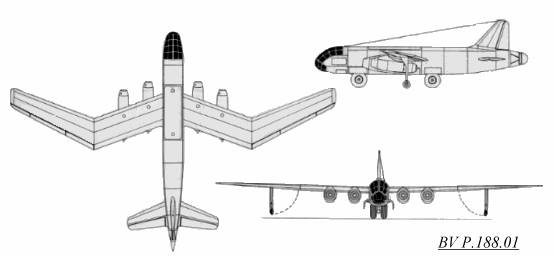 This was the first design of the Blohm und Voss P.188 jet bomber. The fuselage
center section was designed as an armored steel shell which was to hold
the fuel supply, with the forward and rear sections being bays for the
tandem twin main landing gear wheels. The wing had a constant 3 degree
dihedral and was of a very novel design, featuring both a 20 degree swept
back inner section and then a 20 degree swept forward outer section. This
was calculated to give good performance at both low and high speeds. The
only drawback was excessive air pressure on the wing tips, which was to
be corrected by a variable incidence system which could be adjusted through
12 degrees. A crew of two sat in the extensively glazed, pressurized cockpit,
which was flush with the fuselage. Four Jumo 004C turbojets were mounted
in four single nacelles, two beneath each wing. There were also an auxiliary
'outrigger' type landing gear outboard of the engine nacelles, these being more to steady
the aircraft, and did not touch the ground when it was on an even keel.
The tail was of a single fin and rudder design, and the extreme tail had
an airbrake. There was no armament fitted and the bombload was 1000 kg
(2200 lbs.) which was to be carried internally.
This was the first design of the Blohm und Voss P.188 jet bomber. The fuselage
center section was designed as an armored steel shell which was to hold
the fuel supply, with the forward and rear sections being bays for the
tandem twin main landing gear wheels. The wing had a constant 3 degree
dihedral and was of a very novel design, featuring both a 20 degree swept
back inner section and then a 20 degree swept forward outer section. This
was calculated to give good performance at both low and high speeds. The
only drawback was excessive air pressure on the wing tips, which was to
be corrected by a variable incidence system which could be adjusted through
12 degrees. A crew of two sat in the extensively glazed, pressurized cockpit,
which was flush with the fuselage. Four Jumo 004C turbojets were mounted
in four single nacelles, two beneath each wing. There were also an auxiliary
'outrigger' type landing gear outboard of the engine nacelles, these being more to steady
the aircraft, and did not touch the ground when it was on an even keel.
The tail was of a single fin and rudder design, and the extreme tail had
an airbrake. There was no armament fitted and the bombload was 1000 kg
(2200 lbs.) which was to be carried internally.
![]() Tor Pedersen's BV P.188.01 images
Tor Pedersen's BV P.188.01 images
Span: 27 m (88' 7.8") Length: 17.45 m (57' 3.5") Max. Speed: 820 km.h (509 mph)

The Blohm und Voss P.188.01 w/Hs 293C-4 (Hs 294) anti-ship missiles
Image from ReichDreams Dossier # 14, Forward-Swept Wing Planes by J. Miranda and P. Mercado